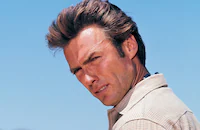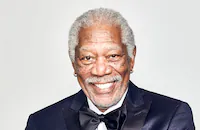Unforgiven

Brief Synopsis
Cast & Crew
Clint Eastwood
Clint Eastwood
Gene Hackman
Morgan Freeman
Richard Harris
Jaimz Woolvett
Film Details
Technical Specs
Synopsis
In the Old West, retired gunslinger William Munny is in need of money and reluctantly takes on one last job. A group of prostitutes have offered a $1,000 reward for killing the two cowboys who disfigured one of their girls. Joined by his former partner and an eager young sharp-shooter, Munny travels from Kansas to Wyoming for the killing, and along the way he is forced to confront his violent past.
Director

Clint Eastwood
Cast

Clint Eastwood

Gene Hackman

Morgan Freeman

Richard Harris
Jaimz Woolvett
Henry Kope
John Pyper Ferguson
Larry Reese
Ron White
Michael Charrois
Gregory Goosen
Garner Butler
David Mucci
Anthony James
Lochlyn Munro
George Orrison
Ben Cardinal
Beverley Elliott
Cherrilene Cardinal
Sam Karas
Robert Koons
Tara Dawn Frederick

Saul Rubinek
Michael Maurer
Aline Levasseur
Jimmy Herman
Larry Joshua
Paul Mclean
Josie Smith
Frances Fisher
Jeremy Ratchford
Philip Maurice Hayes
Jefferson Mappin
Bill Davidson
Blair Haynes
Liisa Repo-martell
Walter Marsh
Anna Thomson
Shane Meier
Rob Campbell
Frank C. Turner
Locklyn Munro
Mina Mina
Crew
Stuart Aikins
Edward Aiona
Bob Akester
Dick Alexander
Diane Anderson
Mark Anderson
Sheila Aquiline
Bill Bannerman
Donah Bassett
Lynne Bespflug
Tom Bews
Janice Blackie-goodine
Ray Breckenridge
Henry Bumstead
Neil Burrow
Marco Ciccone
Michael Cipriano
Joel Cox
Doug Craik
Devon Curry
Gordon Davidson
Gordon Davidson
Keith Dillin
Phil Downey
Clint Eastwood
Stan Edmonds
Tom Eirikson
Lynn Elston
Michael Evje
Robert Fernandez
Iloe Flewelling
John Frazier
Les Fresholtz
Penny Gibbs
Tom Glass
Dean Goodine
Adrian Gorton
Bob Gray
Jack N Green
Jack N Green
Peter Green
Jim Gregor
George Griffiths
Robert J. Groff
Bill Haines
Michael Hancock
Joanne Hansen
Donald Harris
Dan Heather
Carla Hetland
Phyllis Huffman
James J Issacs
Rose Johnson
Rose Johnson
Nadene Katz
Jeffrey Kloss
Jan Kobylka
Anisa Lalani
John Lind
Grant Lucibello
Julian Ludwig
Randy Luna
Scott Maitland
Cindy Marty
Michael Maurer
Chuck Mcsorley
Michael Mirkovich
James J Murakami
Alan Robert Murray
Hal Nelson
Lloyd Nelson
Walter Newman
Lennie Niehaus
Kimberly Nolan
Valerie O'brien
Rino Pace
Matt Palmer
David Peoples
Victor Perez
Carol Pershing
Vern Poore
Gary C Ripley
Tony Rivetti
Rick Roberts
Bruce Robinson
Melissa Rooker
Tom Rooker
Maurice Routely
Michael Ruiz
Charlie Saldana
T. Daniel Scaringi
John Scott
Hal Selig
Mike Sexton
Karen Spangenberg
Stephen St John
Tom Stern
Randy Swanson
Carey Toner
Carol Trost
Ron Trost
Loranne Turgeon
David Valdes
David Valdes
Buddy Van Horn
Roger J. Vernon
Jeffrey Wetzel
Doug Wilson
Karen Wilson
Marshall Winn
Butch Wolf
Glenn Wright
Cathy Yost
Rob Young
Kelly Zombor
Film Details
Technical Specs
Award Wins
Best Director
Best Editing
Best Picture
Best Supporting Actor
Award Nominations
Best Actor
Best Art Direction
Best Cinematography
Best Original Screenplay
Best Sound
Articles
Unforgiven
The narrative is set in the 1880s, and opens in a brothel in the dusty Wyoming cow town of Big Whiskey. One of the working girls has just had her face slashed by a cowpoke client, all for the transgression of giggling at the man's endowment. The slasher and his partner are dragged before the town's despotic sheriff, Little Bill Daggett (Gene Hackman), whose notion of sufficient punishment is to have the men make good on the whore-master's expenses in bringing his now "damaged goods" to town. The miscarriage of justice so inflames the prostitute Strawberry Alice (Frances Fisher) that she pools her colleagues' savings, some $1000, and offers it up as a bounty on the offenders.
The story shifts to a ramshackle Kansas homestead, where aging widower William Munny (Eastwood) is struggling to care for his two young children. While tending to his hogs he is visited by a cocky youngster (Jaimz Woolvett) with visions of himself as a mythic gunslinger with the moniker "The Schofield Kid". News of the hookers' gold has spurred him to find a partner to help him collect, and he can barely conceal his disappointment in finding this broken-down pig farmer in the place of the legendary gunfighter he came to recruit. As it turns out, Munny's late wife had steered him into a honest, pious life; with his family's fortunes fading, however, the temptation provided by the bounty is irresistible. Over the Kid's objections, Munny rouses his old accomplice Ned Logan (Morgan Freeman) from his similar domestic retirement for backup.
The legend of the bounty, however, has also reached an incensed Little Bill, who rouses his deputies to disarm any stranger entering Big Whisky. The brutal lawman makes a public example of the first such gunslinger who arrives to collect the prize, a big-hat, no-cattle British dandy known as English Bob (Richard Harris). The unfolding of the fates of the Munny party as they ride into certain disaster take Unforgiven to a jarringly violent conclusion.
Screenwriter David Webb Peoples had authored his script (originally titled The Cut-Whore Killings) on spec all the way back in 1976; Francis Ford Coppola picked up the option, and held onto it through the Zoetrope Studios' collapse in the early '80s. Soon afterwards, Eastwood was handed a copy as an example of Peoples' work, and immediately sought the rights. As recounted in Richard Schickel's Clint Eastwood, the star's rapt interest appalled his story editor, Sonia Chernius. "We would have been far better off not to have accepted trash like this piece of inferior work," she stated in a memo. "I can't think of one good thing to say about it. Except maybe, get rid of it FAST."
In a 1992 interview for Cahiers du Cinema, Eastwood expounded on what separated Unforgiven from his previous Westerns. "[T]he film deals with violence and its consequences a lot more than those I've done before," the star stated. "In the past, there were a lot of people killed gratuitously in my pictures, and what I liked about this story was that people aren't killed, and acts of violence aren't perpetrated, without there being certain consequences. That's a problem I thought was important to talk about today, it takes on proportions it didn't have in the past, even if it's always been present through the ages."
There's actually quite a bit that separates Unforgiven from the rest of Clint's sagebrush oeuvre. Consider the feminist subtext spurring the plot, his willingness to play a bounty hunter whose skills had eroded and his handing of the supporting roles to actors with the gravitas of Hackman, Freeman and Harris. As a result, these elements make the film seem fresh and elegiac at the same time. (Eastwood dedicated the film to the two directors that most profoundly affected his early career and own behind-the-camera aspirations, Sergio Leone and Don Siegel.) In August 1992, after the studios had rolled out their big-budget, special effects extravaganzas of that summer, Unforgiven made its way into theaters with relatively little fanfare, and audiences and critics that were hungry for more adult fare flocked to it eagerly.
The film received an aggregate eight Oscar® nominations, and ultimately also captured the prizes for Joel Cox's editing and Hackman's supporting performance. Hackman, whose characterization was at least partially inspired by former LAPD police chief Darryl Gates, gave his usual flavorful effort as the autocratic lawman with carpentry skills as suspect as his moral code. He had initially passed on the script as too violent, and ostensibly has no regrets about having reconsidered.
Producer: Clint Eastwood, Julian Ludwig, David Valdes
Director: Clint Eastwood
Screenplay: David Webb Peoples
Cinematography: Jack N. Green
Film Editing: Joel Cox
Art Direction: Adrian Gorton, Rick Roberts
Music: Lennie Niehaus
Cast: Clint Eastwood (William `Bill¿ Munny), Gene Hackman (Little Bill Daggett), Morgan Freeman (Ned Logan), Richard Harris (English Bob), Jaimz Woolvett (the Schofield Kid), Saul Rubinek (W.W. Beauchamp).
C-135m. Letterboxed.
by Jay S. Steinberg

Unforgiven
Quotes
Trivia
Miscellaneous Notes
Voted best picture of the year by the Boston Society of Film Critics (1992). Also cited for best supporting actor (Gene Hackman) and best cinematography.
Voted Best Picture of the Year (1992) by the National Society of Film Critics. Also cited for Best Director, Best Screenplay, and Best Supporting Actor (Gene Hackman).
Voted Best Picture of the Year (1992) by the Los Angeles Film Critics Association. Also cited for Best Director, Best Screenplay, Best Actor (Clint Eastwood) and Best Supporting Actor (Gene Hackman).
Named best film of the year (1992) by the London Film Critics Circle.
Gene Hackman was named best supporting actor by the New York Film Critics Circle (1992).
Clint Eastwood won the Directors Guild of America's 1992 Outstanding Directorial Achievement Award.
Clint Eastwood was honored as director of the year (1992) by NATO/Showest.
Clint Eastwood and David Valdes were nominated for the 1992 Golden Laurel Award by the Producers Guild of America.
Released in United States Summer August 7, 1992
Limited re-release in United States January 15, 1993
Released in United States on Video July 7, 1993
Screenwriter David Webb Peoples wrote the screenplay for "Unforgiven," originally known as "The Cut-Whore Killings," in 1976; it was optioned by Clint Eastwood in the mid-1980s.
Began shooting August 26, 1991.
Completed November 12, 1991.
Wide re-release in USA February 19, 1993.
Released in United States Summer August 7, 1992
Limited re-release in United States January 15, 1993
Released in United States on Video July 7, 1993
Selected in 2004 for inclusion in the Library of Congress' National Film Registry.















